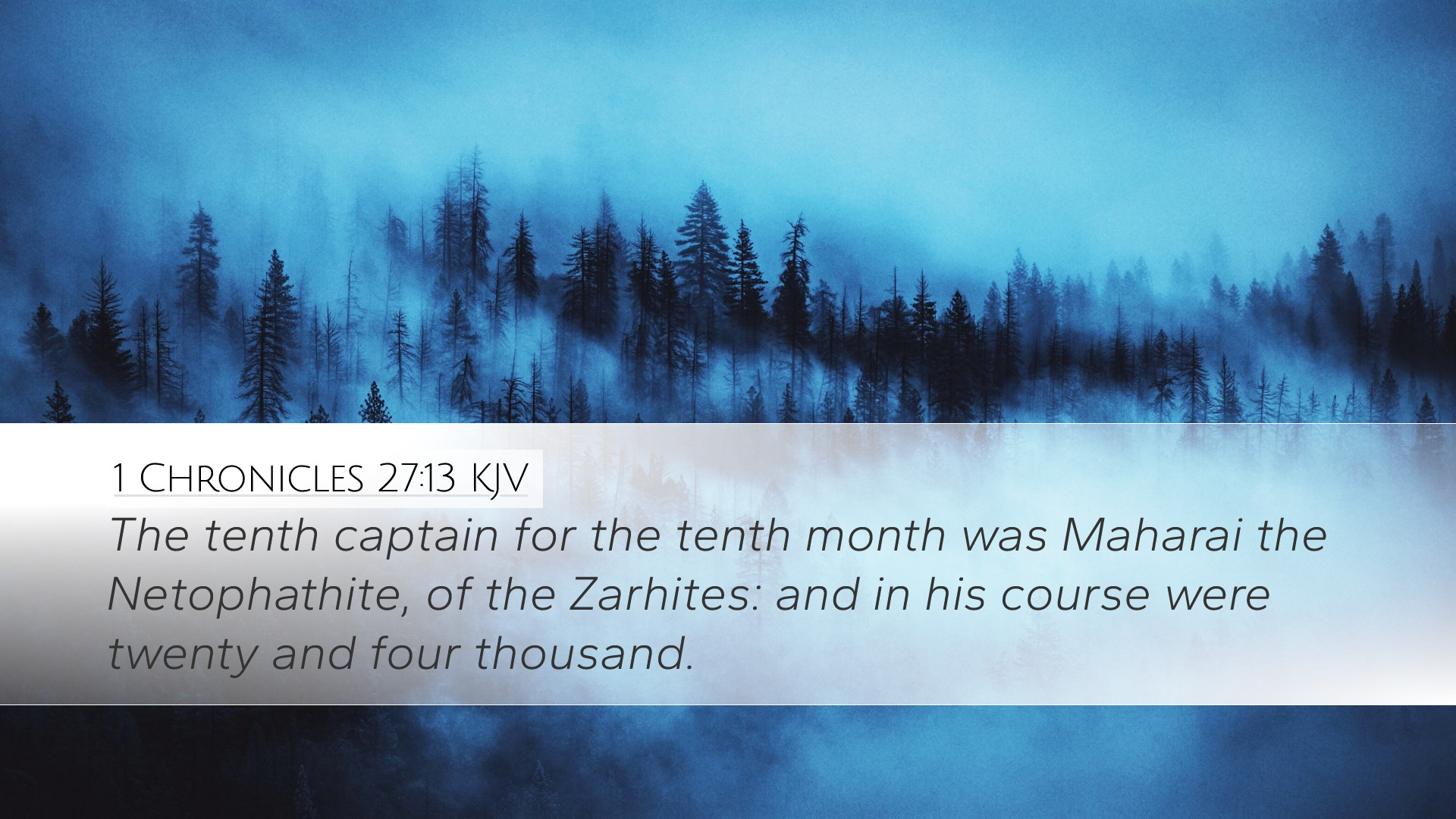Commentary on 1 Chronicles 27:13
In 1 Chronicles 27:13, we find a brief mention of the tribal leaders who were responsible for the military service of Israel:
"The twelfth captain for the twelfth month was held by Heldai the Netophathite, of Othniel; and in his course were twenty and four thousand."
Contextual Overview
This passage forms part of a larger section in 1 Chronicles which details the organization of King David's military forces and administrative officials.
Chapters 27 to 29 in 1 Chronicles reflect the structure of authority during David's reign and his preparation for the temple's construction.
David, in his later years, sought to ensure that Israel was adequately governed, particularly in military matters, signaling his desire for order and stability.
Insights from Commentaries
Matthew Henry's Commentary
Matthew Henry highlights the significance of organization in David’s administration, noting that "the captains of the host were
arranged in a systematic manner according to the months of the year". This approach not only facilitated military readiness but also communicated
the importance of preparation in all affairs of state.
Moreover, Henry emphasizes the diverse leadership illustrated by the names of the captains, which symbolize inclusivity in the kingdom.
He asserts that God’s arrangement of leaders among the tribes serves to remind us that the divine governance encompasses all aspects of life.
Albert Barnes' Notes
Albert Barnes draws attention to the structure of leadership presented in this verse. He states that the appointment of leaders like
Heldai the Netophathite illustrates the importance of regional representation in David's military organization.
Barnes points out that a multitude of leaders from various backgrounds reflects God’s provision for a well-rounded and diverse
administration, which is crucial for both governance and military success.
Additionally, Barnes discusses the numerical aspect of this system, with each captain commanding 24,000 men.
This signifies David's serious commitment to maintaining a strong defense against enemies, allowing for flexibility and
rapid mobilization whenever necessary.
Adam Clarke's Commentary
Adam Clarke provides a historical context to the names mentioned in this verse, recognizing that
Heldai was not only a leader but also a representative of the southern regions of Israel. Clarke interprets the choice of leaders
as indicative of the political unity David sought to establish. His appointment of a leader from a relatively obscure tribe
draws attention to the underlying principle that God can empower anyone to leadership positions when there is humility and obedience.
Furthermore, Clarke emphasizes the themes of vigilance and accountability. The detailed listing of military leaders reinforces
the notion that true leadership in the kingdom of God necessitates vigilant stewardship over resources—both human and material.
Theological Reflections
The account in 1 Chronicles 27:13 serves as a reminder of several key theological themes:
- The Sovereignty of God: The systematic arrangement of leaders reflects God's ultimate authority over nations and peoples.
- Preparedness and Order: David’s meticulous organization of military service serves as an example for church leadership to pursue order and readiness.
- Inclusivity in Leadership: The inclusion of leaders from various tribes illustrates the principle that God calls individuals from all walks of life to serve.
- Human Agency and Divine Will: God works through appointed leaders, reminding us of our role in carrying out divine purposes.
Conclusion
In conclusion, 1 Chronicles 27:13 presents a snapshot of the administrative wisdom of King David in organizing military leadership
for the nation of Israel. Insights gleaned from the public domain commentaries of Matthew Henry, Albert Barnes, and Adam Clarke highlight
the importance of order, diversity, and accountability in leadership. As pastors, students, theologians, and biblical scholars reflect upon this
passage, they are encouraged to draw lessons on governance, stewardship, and God's divine orchestration of leadership in communities
today, emphasizing that every role, no matter how small it may seem, contributes to the greater narrative of God's kingdom.


